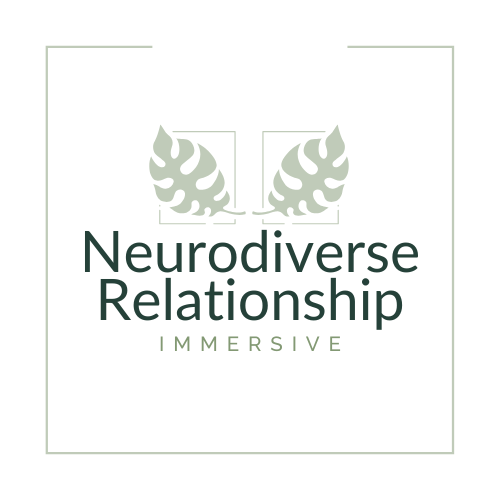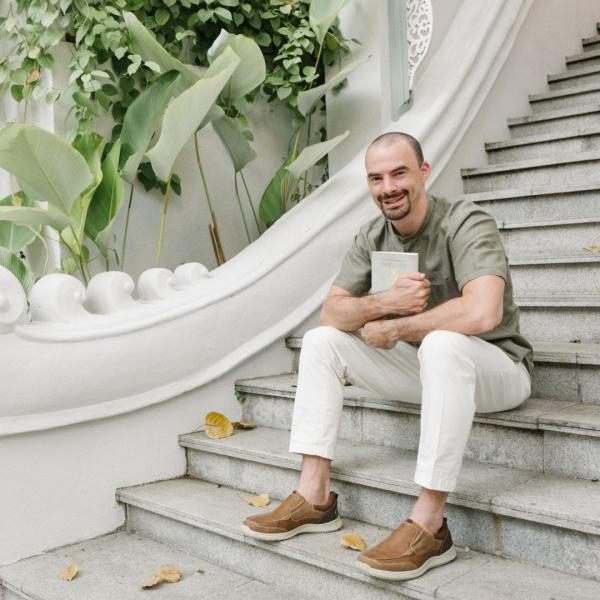
TRANSFORM YOUR NEURODIVERSE RELATIONSHIP WITH THE GENTLE GUIDANCE OF AN EXPERIENCED NEURODIVERGENT PRACTITIONER
The Challenge of Neurodiverse Relationships
Satisfying, reciprocating relationships are hard to build in general, and there are additional challenges in neurodiverse relationships.
Often times a neurodiverse relationship struggles so intensely, not because they're fundamentally incompatible, rather they haven't found the help they need to mindfully deconstruct and reconstruct a healthy partnership that takes into account their differences.
Having a dedicated space to explore one another's needs in a safe context can make all the difference in a relationship growing to an amazing place, or stagnating and falling apart.

Who You're Working With

Luke Smallcomb, MA
Mental Health Practitioner Specializing in Neurodiversity + Trauma
Luke has his Masters in Clinical Counseling, and has found great fulfillment working with clients for over a decade as he has been on his own journey of trauma recovery and self acceptance. Being part of a mutually satisfying neurodiverse relationship for two decades has been his greatest teacher regarding relationships. Luke loves to cultivate an environment of emotional safety with couples that allows them to repair their relationship and experience deep connection, peace and support.

“A great relationship is about two things: First, appreciating the similarities, and second, respecting the differences.” Unknown

Discover a path to mutual connection, safety and support as you learn to better understand your needs and your partners needs through the lens of your neurotypes.
6 Weekly Couple's Sessions Dedicated to Exploring:
-
Week 1- Conflicting Perspectives + Needs
You probably already recognize that you and your partner experience the world in fundamentally different ways, maybe in areas like sensory sensitivities, your communication styles or emotional regulation. But what to do about this? Navigating these differences requires mutual empathy, patience, and a willingness to learn from and believe your partner's experience- but after years of hurt and struggle, it can be hard to do this without outside support. Luke invites both partners to create an environment for each other to feel safe enough to access their own truth and express it in a way their partner can better understand.
-
Week 2- Masking + Burnout
Many neurodivergent individuals realize that masking is a significant aspect of their lives. It's an attempt to adapt to life in a world built for neurotypicals, but most people find masking to negatively impact them and lead to mental and physical side effects, including burnout. In a relationship, this could look like sudden withdrawal, irritability, or emotional shutdowns that seem disproportionate to the situation. Recognizing these patterns as signs of stress rather than rejection helps partners respond with compassion rather than confusion or hurt. Creating times for both people to be their most authentic selves, without judgment is vital for the long-term health of the individuals and relationship.
-
Week 3- Communication + Repair
Communication and repair are notoriously difficult in neurodiverse relationships, where differences in processing, expression, and understanding can easily lead to miscommunication. Many partners become frustrated because their frequent miscommunication holds them back from growth as a couple. Coming up against the same resistance and road blocks over and over creates painful distance between each other. Luke supports couples as they navigate the complicated waters of communicating in a way that feels authentic to them, while being mindful of their partners' need to understand. When a healthy balance can be found, partners grow in genuine understanding of one another and develop the strength to regularly build bridges of repair.
-
Week 4- Emotional Connection + Intimacy
Neurodiverse partners may express or interpret emotions in very different ways, making satisfying emotional connection complicated. One partner might seek verbal reassurance or emotional nuance, while the other may struggle to recognize or respond to these cues in real time. One partner may want to go out on adventures together, while the other wants to snuggle up and be together at home. One partner may be direct and straight-forward, which the other could interpret this as cold and uncaring. One partner may crave frequent time together, while the other needs a lot of alone time. Whatever the difference, partners often report feelings of disconnection or rejection, even when care is present between each other. Luke helps partners tap into patience, curiosity, and a willingness to learn each other’s emotional language, so that they can create shared relational rhythms that honor both partners’ needs and ways of relating.
-
Week 5- Overfunctioning + Underfunctioning
Over-functioning and under-functioning dynamics are common in neurodiverse relationships, often emerging from attempts to manage differences in executive functioning, communication, or emotional regulation. A combination of over and under-functioning can be present in each partner, and can lead to a lack of healthy individuation between partners. One partner may take on more responsibilities—organizing, initiating, or emotionally caretaking—while the other may become more passive or dependent, not out of laziness but due to overwhelm or difficulty navigating certain tasks. These patterns are highly adaptive responses that often develop as a result of childhood conditioning, rather than personal failings. However, over time, these imbalances can create disconnection, resentment, or burnout. Luke supports couples to recognize the specifics of their own patterns, clarify strengths and limits, and redistribute roles more equitably- which opens the doors to greater trust and intimacy.
-
Week 6- Celebration: Special interests, Hobbies and Passions
Special interests and hobbies are a source of joy, self-regulation and a powerful avenue for connection and mutual appreciation. For neurodivergent individuals, engaging with special interests can be deeply fulfilling and grounding, helping reduce stress and enhance well-being. When partners take time to understand, support, or even participate in each other’s interests—whether or not they share the same enthusiasm—it fosters respect, intimacy, and a sense of being seen and valued for who they truly are. Luke helps partners explore their interests openly with their partner, and their partner to receive their vulnerability with honor and care. Couples that can learn to embrace one another's passions, find their relationship enriched, expanded and simply more fun!
What Past Clients Have Shared:
"Luke's ability to attune and be present is so evident. The breadth of experience and training clearly showed his passion and skills. The space he creates is nothing short of sacred. The process was hard, life giving, revealing, vulnerable, and was lead with deep compassion and care from Luke. My wife and I have gained deeper connection and the ability to traverse the winding road of marriage with greater capacity."
"From our first consultation with Luke, my husband and I felt immediately safe to share our stories. Luke is an incredibly skilled and compassionate therapist who was able to attune to us (even through a screen). Each week, we appreciated having a dedicated space to work through the challenges in our marriage. Our marriage is thriving - we attribute it to the work we did with Luke and the support we received from Flourish Therapy."
"Thank you for using your pain and what you have learned to help others. There are very few counselors out there that are as effective as you have been. We are greatly indebted to you for helping us not only save our marriage, but thrive individually and as a couple."
Frequently Asked Questions
Check out these answers to better understand if the Neurodiverse Relationship Immersive is for you:
What if we don't have a formal diagnosis?
If you, your partner, or both of you resonate with neurodivergent descriptions and identify as neurodivergent, you are more than welcome to utilize this offer. Many people who discover neurodivergence in adulthood self-diagnose for a variety of reasons, making this a completely acceptable path of discovery. If you aren't sure you identify as neurodivergent, but have relationship struggles that seem like they could be related to neurodivergence, this offer could be a great place of exploration and support.
How does this differ from trauma healing work?
The Neurodiverse Relationship Immersive is a targeted offer for those looking to improve their neurodiverse relationship. While Luke's trauma-informed, attachment lens is ever present, this offer is not a deep-dive into trauma healing work like our 3-6 month packages are. The time together is more structured and solution-focused, helping clients experience shifts in their understanding and relating, in the context of healthy neurodiverse relationship principles.
What if there is control or abuse in my relationship?
This is a complicated question, and why we require folks interested in this offer to fill out an application for this offer first. If, after reviewing the application, Luke is not sure if it's a good fit, he will reach out and request a discovery call with the couple. As a general principle, it is not good practice to do couples work when the relationship has abuse dynamics. However, when partners in a neurodiverse relationship are in distress, abusive behaviors can develop. It takes the support of a skilled practitioner to help ascertain if the partner showing abusive behaviors desire is to control and dominate their partner, or if their behaviors are coming from poor attempts at managing their own internal distress. When it is the latter, we find that the client has receptivity and a willingness to change. Regardless of whether there is abuse present or not, individual sessions are the best option when there is not enough safety established yet between the couple.
What can I expect to see happen in my relationship?
Every couple's journey is unique. However, many couples notice more connection, an increased sense of understanding, and decreased sense of shame and frustration, as their needs are better understood and met by themselves and their partner.
Who are the ideal clients for the Neurodiverse Relationship Immersive?
The ideal clients for this offer are those who are in the process of gaining deeper awareness of themselves and their neurotype, coupled with the desire to better understand and support their partner. Relationships where there are patterns of abuse and control are most likely not ideal for this offer. (See above question: "what if there is control or abuse in my relationship")
Is 6 weeks enough time?
We have found 6 weeks to be a good amount of time to begin to see some significant shifts in couples who are open and motivated to improve their relationship. Having dedicated time and space to build a healthier neurodiverse relationship can prove invaluable.
What if we want to keep working with you after the 6 weeks?
If the immersive was beneficial to you, and you're not ready for it to be done, we welcome clients to sign up for a subsequent 6-week immersive. The second 6 weeks allows you time to revisit previous areas of growth at a deeper level, or explore something entirely different related to your neurodiverse relationship.
What if we're still not sure?
An application is all that is required to access this offer, but if you're not sure if this offer is right for you, or you want to meet Luke before you commit, a free discovery call is available.

"When we know that our partner cares about us and what we are going through, it becomes easier to show that caring in return. Focus on that part of you that cares for the other and give them the chance to care for you." Dr. Don Cole
Feeling Unsure?
Contact us for a free discovery call to explore if the Neurodiverse Relationship Immersive is a good fit for you and your partner